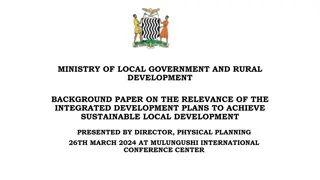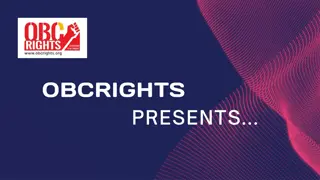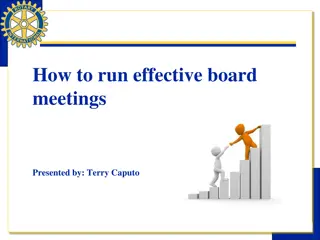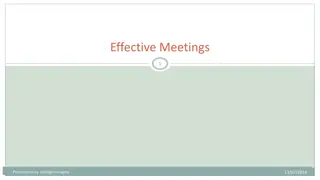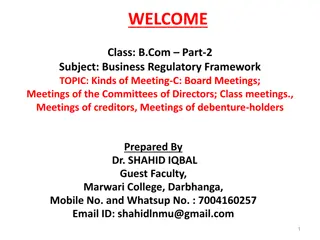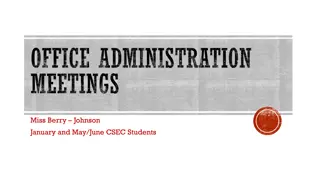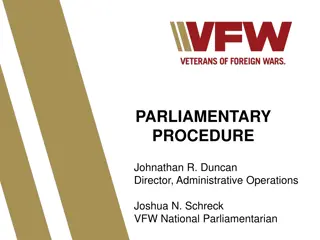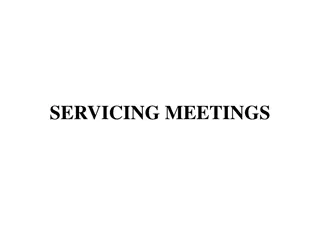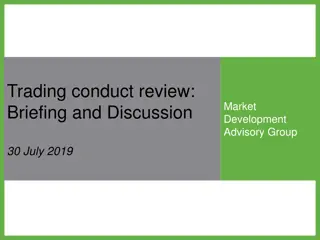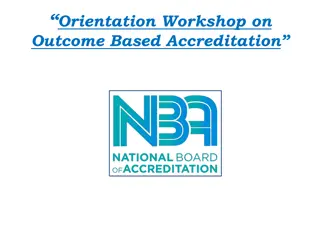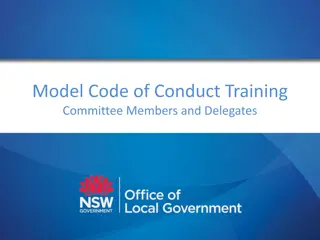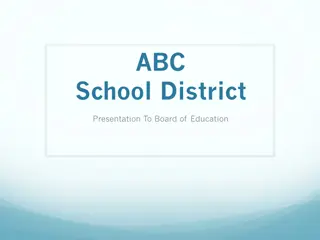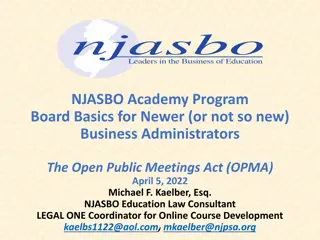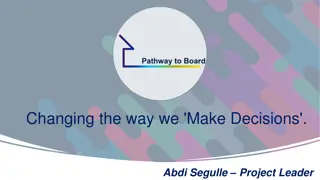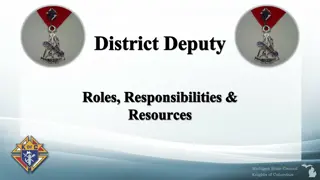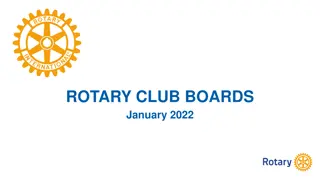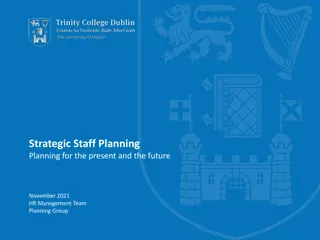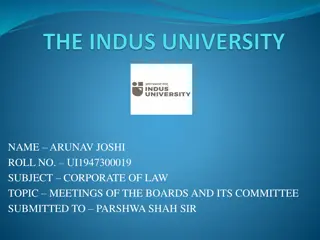Effective Planning and Conduct of School Board Meetings in Birchwood School District
Explore key aspects of planning and conducting effective school board meetings in Birchwood School District, including meeting procedures, rules of order, public participation, and local policy examples. Learn about the Wisconsin Open Meetings Law and statutory requirements for board meetings.
Download Presentation

Please find below an Image/Link to download the presentation.
The content on the website is provided AS IS for your information and personal use only. It may not be sold, licensed, or shared on other websites without obtaining consent from the author.If you encounter any issues during the download, it is possible that the publisher has removed the file from their server.
You are allowed to download the files provided on this website for personal or commercial use, subject to the condition that they are used lawfully. All files are the property of their respective owners.
The content on the website is provided AS IS for your information and personal use only. It may not be sold, licensed, or shared on other websites without obtaining consent from the author.
E N D
Presentation Transcript
Coming to Order: How to Plan and Conduct Effective School Board Meetings BIRCHWOOD SCHOOL DISTRICT
Sources of Meeting Procedures and Rules of Order Open meetings law Closed sessions Calling Meetings Setting the Agenda for a Board Meeting Public Participation at Board Meetings School Board Operating Principles and Ground Rules Other meeting related issues: Minutes. Electing officers. Role of Officers
State law Locally developed policy These policies may incorporate a pre-existing parliamentary framework (such as Robert s Rules of Order ) Pieces can sometimes be found in policies that cover related topics (e.g., agenda preparation, minutes of school board meetings, election of board officers, public comment periods, filling vacancies, etc.) Sometimes, local policy will address meeting procedures that apply to a very specific purpose/context (e.g., policy adoption, consent agendas, budget development, public hearings, committee work, the annual meeting, etc.) Local practices that have developed over time - Ad hoc decisions made during meetings.
Locally Developed Policy - Examples Link to Birchwood School District s policies: School Board Meetings
The Wisconsin Open Meetings Law, including: Other statutes: Changes to the amount of tax to be levied or certified, or to the amounts or purposes of appropriations in an adopted budget require a 2/3 vote of the entire membership of the board (section 65.90(5)(a)) Specific procedures must be used to convene in closed session (in open session, there must be an announcement of the business proposed for closed session, a motion, a vote, and each person s vote must be recorded in the minutes) The employment or dismissal of persons holding contracts that are subject to section 118.22 or 118.24 of the state statutes must be determined by a majority vote of the full membership of the board A prohibition on the use of secret ballots (except for the election of board officers) Any member of the board may require that a vote be taken in such a manner that each member s vote is ascertained and recorded Board vacancies are filled by a vote of the remaining members All motions and roll call votes must be recorded, preserved, and (generally) open to the public Statutes that mandate public hearings in connection with certain decisions Limitations on reconvening in open session following a closed session
Governmental bodies must give appropriate and timely notice of the time, date, place, and subject matter of their meetings. (There is a collective bargaining exception.) Meetings of a governmental body shall be open and accessible to interested members of the public, unless the meeting has been lawfully convened in a closed session. A governmental body shall not conduct public business (including meeting to gather information or discuss issues within the board s jurisdiction) outside of the context of a properly noticed meeting.
Wisconsins policy of openness in government. See Wisconsin Statute 19.81(1) The open meetings law applies to meetings of governmental bodies. See Wisconsin Statute 19.83(1)
Governmental Body The term governmental body includes school boards and subunits (i.e., committees) created by a board. Exception for bodies created for or meeting for the purpose of collective bargaining. However, exchange of initial proposals must be in open session.
Meeting In order for there to be a meeting, the numbers and purpose requirements must be met. Numbers: Typically, if one-half or more of the members of a governmental body is present, the numbers requirement is met.
Meeting Numbers: A negative quorum can be created if fewer than one-half of the members can block an action. Purpose: Members must be present to conduct governmental business (e.g., discussion, decision, or information gathering).
Meeting Walking quorum: Series of gatherings of separate groups of members, each less than a quorum, who agree to act uniformly in sufficient number to reach a quorum. Electronic communications: Depending on how they are used, electronic communications such as e-mail or texting could create a meeting.
Requirements If the open meetings law applies, there are a series of requirements that must be met. Notice to (1) the public; (2) news media that has requested notice; and (3) official newspaper or, if no official newspaper, to a news medium likely to give notice in the area.
Requirements In almost all circumstances, notice must be given at least 24 hours in advance of the meeting unless for good cause such notice is impossible or impractical. If good cause exists, the notice should be given as soon as possible and must be given at least two hours in advance of the meeting. Notice must contain time, date, place, and subject matter of the meeting.
Requirements Accessibility: Meeting must be reasonably accessible to members of public and must be open to citizens at all times (excluding closed sessions). The public s right to attend does not require the board to allow citizen participation at the meeting.
Remote Participation There is no express statutory authority that provides for a school board to convene by means of teleconferencing or other remote methods. Wisconsin Attorney General's opinions [69 Op. Att'y. Gen. 143, 145] suggest that telephone conferencing among members of a governing body may be permissible for compliance under the Open Meetings Law when conditions provide for reasonable public accessibility.
Remote Participation To comply with the law, a governmental body conducting a meeting by telephone conference call must provide the public with an effective means to monitor the full content of the conference call. This may be accomplished by broadcasting the conference call through speakers located at one or more sites open to the public.
Remote Participation Opinions of school attorneys can vary as to, for example: whether a board member participating in a meeting via teleconference or web/video conference should be counted in the quorum requirements, and whether it is appropriate to allow a board member to vote on a matter when the board member is not physically present.
Remote Participation Many school attorneys (including the WASB) have taken the position that it is inadvisable for a school board to permit an individual board member who is not physically present at a meeting to participate in the discussion, deliberations, or vote on any matter that involves an individual's due process rights or a quasi- judicial proceeding (e.g., expulsions, employee discipline, etc.). Concerns can also arise with allowing an individual board member to participate in a meeting remotely when the board has convened in closed session.
Remote Participation If a school board wishes to allow an individual board member to participate in a meeting via teleconference, web/video conference, or similar means, it is recommended that the board provide such authority expressly by motion or policy and, minimally, ensure that the open meetings requirements regarding public accessibility have been adequately addressed. In the absence of such express authority granted by the board, an individual board member should not assume that he/she has any right to insist upon participating in a meeting at which he/she is not physically present.
Remote Participation WASB has discouraged boards from having board members who are not present at the meeting vote, unless the board has adopted a policy to allow such participation and the technology is open to the public and the meeting was posted to notify the public of the board member s remote participation.
A board can enter into closed session if one of the statutory exemptions applies. See Wisconsin Statutes 19.85(1)(a) - (h) Meeting must initially be convened in open session. Procedure: Convene initially in open session, presiding officer makes the announcement of the proposed closed session, there is a motion, and then the individual votes on the motion to convene in closed session are recorded. Board can discuss only those items for which it legitimately convened in closed session.
Example exemption: The Board will meet in closed session to discuss offering an employment contract extension to a principal according to Wisconsin Statute 19.85(1)(c) Considering employment, promotion, compensation or performance evaluation data of any public employee over which the governmental body has jurisdiction or exercises responsibility.
Why is it important to keep closed session information confidential? Confidentiality is sometimes required by law. Keeping the information confidential is in the public s interest. Disclosing closed session information destroys trust between board members and between the board and administration. Disclosure could result in legal liability for the individual who discloses the information.
Aside from the school board and its subunit committees, what other governmental bodies might exist in each school district? Specificity of subject matter within a meeting notice Accounting for accessibility of a meeting for interested members of the public Managing public comment periods When does a meeting occur? Negative quorums, Walking quorums, and the use of electronic communications Scheduling meetings / identifying agenda items Closed sessions: appropriate use and procedures School Board Meeting Self-Evaluation Tool
Resources Wisconsin Statutes 19.81-98 Department of Justice 2019 Open Meeting Law Guide WASB Open Meetings Law Brochure WASB Legal Comments, Aug. 2007, May 2006, Sept.- Oct. 2004 (www.wasb.org; go to the School Law Information drop-down menu; click on Quick Links; click on WASB Legal Comments ).
Other Boards (except MKE) The school board in a common or union high school district shall hold a regular meeting at least once each month at a time and place determined by the school board. Unified School Boards The school board shall meet at least once each month and At other times upon the call of the school district president or upon the filing of a request with the school district clerk signed by a majority of the school board members. A special school board meeting shall be held upon the written request of any school board member. The procedure for calling a special meeting begins with filing the request with the school district clerk. Wisconsin Statute 120.43 Wisconsin Statute 120.11
By Board Members: Addressed in Board Policy In most districts, agenda setting is a collaborative and somewhat fluid process, with some deference given to the final decisions of the district administrator and/or board president as to how items will be prioritized from meeting to meeting.
By Board Members: Special Board Meetings: if a board member feels that the board president and/or district administrator are using their discretion to improperly "block" that board member's item(s) of business from being brought forward in a timely manner, the board member can attempt to call a special meeting of the school board.
By Administrators: While the school board has ultimate authority to set its meeting agendas and allocate its meeting time, as a practical matter it is critical to the job of the district administrator that he/she is able to timely raise and place items of business on board meeting agendas. A common practice is that the district administrator and board president work collaboratively to determine the final meeting agenda.
By the Public: Generally, it is undesirable for board policy to state or imply that students, parents, non-administrators, or other individuals in the community have the power to place specific items of business on a board meeting agenda. Such policies may unintentionally create a limited public forum for the exercise of First Amendment rights that would compromise the board's ability to control its meetings.
By the Public: As a practical matter, regardless of any board policy, any individual in the community can raise a suggestion for an agenda item simply by communicating with administrative staff or with an individual board member. In addition, administrative rules and/or staff handbooks can explain how an individual employee can appropriately raise an issue through his/her supervisor. Finally, board policy can direct members of the public to any period of public comment that may be established by the board as part of the agenda for board meetings.
Some state and federal laws require the school board to hold public hearings or seek other public input prior to taking certain actions or adopting certain policies. Examples: Annual budget hearing. Wisconsin Statute 65.90(4) Hearings on borrowing resolutions. Wisconsin Statute 67.05(6a)(a)2.b Hearings on school district requests for a waiver of rules or statutory requirements from DPI. Wisconsin Statute 118.38(1)(b) Hearings regarding the establishment of a charter school. Wisconsin Statutes 118.40(2) and (2m) In some cases, school board policy may specify that the school board will hold a public hearing before the board takes certain actions (e.g., changing school attendance boundaries). .
Most school boards find that it is important to both allow and limit periods of public comment at board meetings. The law provides a lot of flexibility to school boards in structuring public comment periods, but boards must be very cautious about content-based and viewpoint-based restrictions.
It is almost always helpful to have (and follow!) a formal board policy regarding periods of public comment. The presiding officer of the meeting must be willing to assert a strong presence, consistently enforce the rules, and exercise patience. A public comment period is not the only way, or typically the best way, to (1) obtain broad input on an important question; or (2) have fact-specific issues/complaints brought to the District s attention.
A school board has no legal obligation to regularly include a period of public comment on its meeting agendas. When a school board chooses to allow members of the public an opportunity to address the board at a meeting, the period of public comment must be included on the meeting notice. See Wisconsin Statute 19.84(2) When a school board receives public comments on topics/issues that are not otherwise part of the publicly-noticed meeting agenda, it is permissible for board members to briefly discuss and respond to the issue. However, the school board may not take formal action on any such topic/issue (i.e., on a subject that is not otherwise identified in the meeting notice). See Wisconsin Statute 19.83(2) DOJ Open Meeting Law Compliance Guide 2019
The meetings at which a period of public comment will be offered (e.g., regular meetings, special meetings, committee meetings, etc.) Whether comments can be on any topic/issue, or whether the period of public comment will be confined, e.g., to noticed agenda topics The total amount of meeting time that will be allocated to public comment The placement of the public comment period on the agenda (e.g., at the beginning of the meeting, at the end of the meeting, etc.)
The length of time each person will be permitted to speak The class of eligible speakers (e.g., school district residents and taxpayers) ????? Pre-comment speaker registration requirements The ability to make exceptions to the normal procedures Other content-neutral limitations (e.g., prohibiting repetitive appearances, and comments that are obscene, threatening, or that would constitute harassment)
To permit fair and orderly public expression, the Board shall provide a period for public participation at every regular meeting of the Board and may state rules to govern such participation in Board meetings. The presiding officer of each Board meeting at which public participation is permitted shall administer the rules of the Board for its conduct.
The presiding officer shall be guided by the following rules: A. All individuals who comment during the public comment period are reminded that the information is intended to provide information to the Board so that it can fulfill its role. In that vein, all parties are reminded that all information offered be truthful and honest. False statements or stigmatizing charges may subject the individual making such statements to legal repercussions, including, but not limited to, defamation claims. B. Comments that identify students shall be subject to the Wisconsin pupil records law and FERPA. As such, student information that is not directory data as designated by the board, for example individual student behavioral or progress records, shall not be discussed in this forum. Comments that identify personnel are subject to the applicable personnel records state statutes. The Board may inform the speaker that his/her comments are not permitted if in the opinion of the Board it is not subject to release under the above applicable standards.
The presiding officer shall be guided by the following rules: C. Public participation may be permitted as indicated on the order of business, before the Board takes official action on any issue of substance, or at the discretion of the presiding officer. D. Participants must be recognized by the presiding officer and will be requested to preface their comments by an announcement of their name and address. E. Each statement made by a participant may be limited to three (3) minutes duration. F. Participants shall direct all comments to the Board President, not to individual Board members.
The presiding officer shall be guided by the following rules: G. The presiding officer may: 1. interrupt, warn, or terminate a participant's statement when the statement is too lengthy, personally directed, abusive, obscene, or irrelevant; 2. request any individual to leave the meeting when that person does not observe reasonable decorum.
The presiding officer shall be guided by the following rules: H. When hearing citizen concerns regarding matters not specifically included on the noticed meeting agenda, the Board or Committee may discuss topics raised by citizens; however, no Board action may be taken on such topics other than to refer topics not included on the agenda for study by appropriate Board committees, administrative personnel, or placed on a future agenda. I. While the School Board is in Open Session, reasonable effort shall be made to accommodate any person desiring to record, film or photograph the meeting. Recording, filming or photographing the meeting in a manner that interferes with the conduct of the meeting or the rights of the participants is not permitted.
A period of public comment is a type of designated forum for speech that, generally speaking, has a substantial degree of protection under the First Amendment including a requirement of viewpoint neutrality Any content-based exclusion of speech in a designated forum must serve a compelling government interest and be narrowly drawn to achieve that end. The government may enforce reasonable time, place and manner restrictions, provided they are content-neutral, narrowly tailored to serve a significant government interest, and leave ample alternative channels for communication.
Very complex issues can arise when: 1. A speaker presents a complaint dealing with the alleged conduct of individual students or individual staff members; or 2. A district employee decides to speak to the school board during a public comment period; or 3. A board member recuses him/herself from the board and goes and speaks from the audience at a public comment period.
Many districts start the period of public comment by having the presiding officer deliver a standard speech that: (1) identifies procedures; and (2) reminds speakers that they are not immune from legal consequences related to the content of their speech. The presiding officer needs to consistently enforce any established limitations on speaker time or content.




